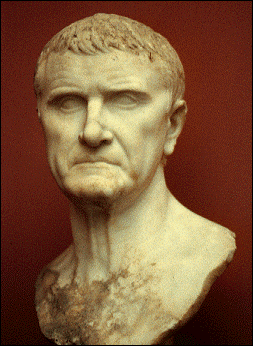by Evropa Soberana

The Jews in the Roman Empire
Around 55 BCE the Republic, too large and militarized, was calling for a new form of government. And it was de facto governed by the so-called Triumvirate: an alliance of three great military commanders: Marcus Licinius Crassus—bust above: the one who crushed the Spartacus revolt in the year 74 BCE—, Pompey, the conqueror of Syria, and Julius Caesar, the conqueror of Gaul.
In 54 BCE, Crassus, then Roman governor of the province of Syria, while spending the winter in Judea decreed on the population a ‘war tax’ to finance his army, and also plundered the temple of Jerusalem, stealing its treasures (for value of ten thousand talents), causing a huge stir in the Jewish quarter. Crassus and the vast majority of his army would be massacred by the Parthians in the unfortunate Battle of Carrhae in 53 BCE. [1]
Lucius Cassius Longinus, one of Crassus’ commanders who had managed to escape the Carrhae massacre with his 500 horsemen, returned to Syria to prepare for a counter-attack and re-establish the devalued Roman prestige in the province. After expelling the Parthians, Cassius had to face a rebellion of the Jewry, which had risen as soon as Jews learnt that the hated Crassus had been killed.
Cassius became an ally of Antipater and Hyrcanus II. After taking Tariquea, a Judean stronghold and execute one of the leaders of the rebellion who had ties with Aristobulus, Cassius captured 30,000 Jews. In the year 52 BCE he sold them as slaves in Rome.
This was the beginning of subversion within Rome itself, since these 30,000 Jews (later freed by Mark Antony and his descendants), dispersed throughout the Empire, would not cease henceforth to promote agitation against of the hated Roman authority. They would have an important role in the construction of the underground catacombs and synagogues, which were later the first preaching field of Christianity. Cassius would later be appointed governor of Syria.
In 49 BCE Crassus was killed and the Triumvirate broken. Civil war broke out between Pompey and Caesar: one of whom, inevitably, was to become the autocratic dictator of the entire empire. Hyrcanus II and Antipater decided to take sides with Caesar, who had Antipater as regent. Julius Caesar would soon take control of the situation, and Pompey was assassinated in Egypt by conspirators.
In 48 BCE, while the Roman and Ptolemaic fleets were engaged in a naval battle, an event was held to further tense the relations between Jews, Greeks and Egyptians: the burning of the library of Alexandria.
Of all the ethnic groups that were in the city, none could have anything against the library. The Greeks had founded it; the Egyptians had contributed much to it, and the Romans sincerely admired this Hellenistic legacy. The Jews, however, saw in the library an accumulation of ‘profane’ and ‘pagan’ wisdom, so that if there was a group suspected of the first burning of the library, logically it was the Jewish quarter, or the most orthodox and fundamentalists sectors. At least that’s what the inhabitants of Alexandria should have thought.
In 31 BCE, the year of a strong earthquake in Israel that killed thousands of people, Cleopatra and Mark Antony committed suicide after their fall from grace.
Flavius Josephus mentions, during the reign of Augustus, a judicial complaint in which 8,000 Jews supported one of the parties. These Jews were to be all adult males, and since a nuclear family used to be of four or five people, we may conclude that at the time of Augustus there were about 35,000 Jews in Rome.
__________________
[1] Crassus, who committed a crass (hence the expression) blunder during the battle, was responsible for the massacre of 20,000 soldiers at the hands of the Parthians. Another 10,000 Roman soldiers were taken prisoners and sent to forced labour to what is now Afghanistan. Many ended up fighting, under Parthian control, against the Huns. We lose their trail onwards. Genetic analyses seem to indicate that this detachment, the famous ‘lost legion of Crassus’, ended in the current Chinese province of Liqian, where they are responsible for a greater frequency of ethnic European features in the native population.